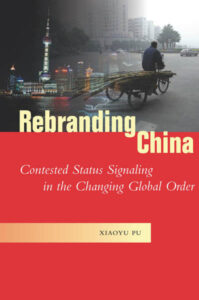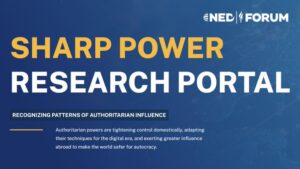Even more than his predecessors, Xi Jinping operates in the shadows. China has published many volumes of excerpts from his speeches. Only recently, however, has a rare leak of secret versions – “one of the most significant leaks of government papers from inside China’s ruling Communist Party in decades” – offered a glimpse of how Mr Xi communicates behind the scenes at a time of crisis, and how the bureaucracy responds, The Economist reports:
Over time bureaucrats, and Mr Xi himself, have preferred and rewarded the most draconian interpretation of his vision. Such was the case following another secret speech by Mr Xi that was subsequently leaked. Delivered shortly after he took power in 2012, it was a warning against ideological laxity. The Soviet Union, he said, had collapsed because nobody had been “man enough to stand up and resist”. A fierce clampdown on dissent ensued.
 China’s more authoritarian turn under President Xi Jinping—particularly rolling back democracy in Hong Kong and oppressing its Muslim populations—have made it more difficult to reset the US-China relationship, notes WIRE’s Jennifer Conrad:
China’s more authoritarian turn under President Xi Jinping—particularly rolling back democracy in Hong Kong and oppressing its Muslim populations—have made it more difficult to reset the US-China relationship, notes WIRE’s Jennifer Conrad:
ON DECEMBER 10, the US Treasury Department imposed sanctions, including a bar on American investments, on SenseTime, a Chinese artificial intelligence company accused of developing facial-recognition software used to target China’s predominantly Muslim Uyghur community. …… In June, President Biden removed some companies from the list, added others, and expanded its scope to include Chinese companies selling surveillance technology. On December 16, eight companies were added to the blacklist, including dronemaker DJI and facial-recognition firm Megvii.
One of the largest remaining independent media outlets in Hong Kong shut itself down Wednesday, notes PBS Newshour (above). The closure came after police raided its offices, arrested editors and board members, and accused them of “sedition.” As Nick Schifrin reports, the death of Stand News, is another significant step in China’s Hong Kong crackdown.
U.S. Secretary of State Antony Blinken tweeted that the administration was “deeply concerned” by the closure of Stand News and related arrests.
“A confident government that is unafraid of the truth embraces a free press,” he added. “We call on the Hong Kong authorities to stop targeting the independent media and release those unjustly detained.”
China’s ‘massive credibility problem’
Internationally, the Chinese system is less attractive than ever among the 17 leading industrialized nations, according to a 2021 study by the PEW Research Center, notes DW China expert Rodion Ebbighausen.” Large majorities in most of the leading industrialized nations view China largely negatively,” the study said. China’s hopes of convincing the world of the superiority of its own system based on major economic successes have failed.

National Endowment for Democracy (NED)
China’s recent claims in a formal white paper that its authoritarian model of one-party rule is in fact a “whole-process democracy” has drawn scorn from serious commentators.
The version of democracy described in the white paper is very different from what is understood in most of the world, U.S. Representative Jim McGovern, a Democrat who chairs the powerful House Rules Committee and co-chairs the Congressional-Executive Commission on China, told VOA.
“Genuine democracy requires respect for all human rights, including freedom of assembly, association and speech, as well as freedom from unwarranted governmental deprivation of the right to life and liberty, consent of the governed, and equal treatment before the law. None of these exist in China,” he said.
Attempt to shift focus
Jessica Ludwig, a co-author of the National Endowment for Democracy’s ‘sharp power concept, sees the white paper as an effort to decouple the meaning of democracy from the principles described by McGovern, VOA adds.
 “A closer look at the language Beijing uses to describe the concept of democracy — emphasizing democracy as ‘whole-process’ and arguing that different systems should be able to co-exist — reflect an effort to redefine democracy as a weaker, more malleable concept,” she said. Beijing is trying to “shift the focus of how democracy is defined into narrower terms of what a government delivers and how efficient its processes are rather than by the values it protects and the accountability of its institutions.”
“A closer look at the language Beijing uses to describe the concept of democracy — emphasizing democracy as ‘whole-process’ and arguing that different systems should be able to co-exist — reflect an effort to redefine democracy as a weaker, more malleable concept,” she said. Beijing is trying to “shift the focus of how democracy is defined into narrower terms of what a government delivers and how efficient its processes are rather than by the values it protects and the accountability of its institutions.”
A new paper from the center-right Forum for American Leadership says it is unrealistic to maintain a National Security stance “that neatly separates domains of ‘competition’ and ‘cooperation.’” The CCP, the document contends, leads an uncompromising “ethno-nationalist Leninist party state that seeks to establish a tribute-state system in eastern Eurasia, and ultimately to challenge the United States for global preponderance.”
The U.S., it adds, should “[h]ighlight Beijing’s continuing, gross abuses of human rights and refute its claims to have developed an alternative model of political and economic organization superior to liberal democracy.”







